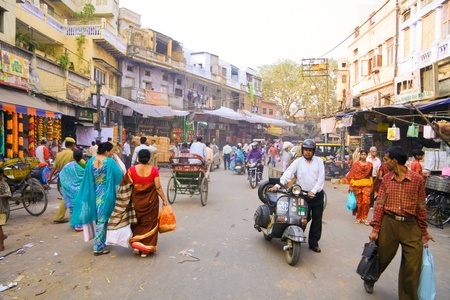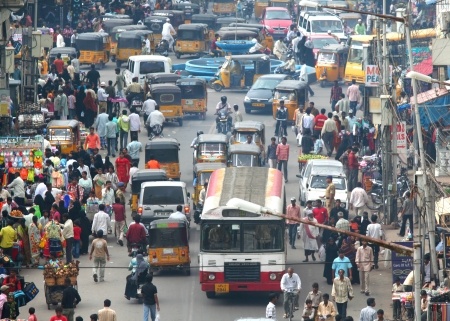How Lack of Safety Impacts Professional Women in India
 Like you, I loathe the obstacles that inhibit or preclude a woman’s ability to work.
Like you, I loathe the obstacles that inhibit or preclude a woman’s ability to work.
I especially abhor the safety challenges women all over the world face on their commutes. Although we hear and read about safety violations most often in India and Brazil, the problem is prevalent in many other countries all over the world.
Recently, I received an email from the International Center for Research on Women (ICRW) about Padma*:
No matter the time of day, as soon as Padma* enters the street, she is jostled and jeered by men and boys living in the neighborhood. One time, she ran into a group of men and boys she’d never seen before. She describes the incident: “[He] touched my breast and pressed them forcefully. There were a number of boys who had even beaten me up and after I lodged a police complaint, the police came just to take the bribe money and never came back again.”
This made me want to know more about what professional women in middle class or more affluent neighborhoods encounter. What do the women who visit our site experience?
 Lack of safety in India
Lack of safety in India
What we learned was not encouraging. A March 2014 New Delhi TV (NDTV) opinion survey revealed that 49% women responded that they feel unsafe. 71% women claimed to feel unsafe in public spaces. In the survey, 52% of women voted for change in men’s attitude, 50% for strict policing and 48% percent voted for stronger laws.
We invited some Indian women in our community to share their perspectives:
“I’m guessing the difference here is that the city is busy, in the sense that very few areas are isolated enough to leave you vulnerable. Does it make the city safer? No. It just lets me feel safer when I have to travel to work. Women here are also more likely to support you if you fight back against a perp. I don’t derive confidence from the level of education of men, or the police. I pretty much rely on common sense, precaution, and the hope that if I need to fight back, one or two people from the crowd will help. Common sense here includes anxiety at having to travel late in the night or missing a bus if it’s too empty, I’m afraid!
I’d say I face harassment to a lesser extent, and of a different, more covert nature. Often, there’s very little I can do about it. What does one say to a man who is staring at you? There’s always the chance he’d deny it entirely. Most times, I just stare back angrily and pray it works.” – Malathi Jogi
“On the issue of women’s safety to and from work, my personal experience (although I don’t commute on a daily basis any more) is that it isn’t restricted to low income neighborhoods. If anything, I have often felt safer in low income neighborhoods in India, which tend to be more crowded than quieter, upscale neighborhoods. The few times I have been flashed, have often been in so-called “posh” areas. Groping, on the other hand, occurs anywhere. I have never seen that ‘upper class’ men are in any way dissuaded from groping women.” – Aparna Vedapuri Singh
“India as a whole is becoming increasingly unsafe for women and even more so when they travel out of their homes. Affluent neighborhoods are a little less at risk than low income ones, but depending on the time of day, both can be equally bad. Women can be eve-teased or mugged just about anywhere. Public modes of transport definitely tend to be more unsafe than private ones but for a girl driving very late at night in her own car can also be a bad idea.
I was recently walking with a friend down my lane, which is in a relatively plush neighborhood, and as early or late as 8 pm in the evening I saw someone blatantly follow us for quite a distance. That is when I thought that the city can be unsafe for just about anyone. One may not know how to react at such times, but it’s best to keep your calm, ignore the person and continue walking to your destination.” – Ritika Bajaj
What Can Be Done
The safety of a country’s citizens is the responsibility of its government and police. Since developing countries need the full participation of women to drive economic prosperity, one of the first things that needs to be done is to ensure women can get work safely.
Some efforts are underway. Corporations are getting involved by providing transportation (sometimes female-only service) for their employees. The Sexual Harassment of Women at Workplace (prevention, prohibition and redressal) Act was passed in 2013.
Payal Gandhi Hoon says, “More women are voicing their opinion and are coming out in the open to report any violation or crime. Though given a choice, most women feel unsafe to approach the (all male bastion) police and are wary of reporting the issue. They would be subjected to a spate of uncomfortable questions without being sure if their case is actually being registered.”
Payal also shared that the newly elected government intends to have 33% of women represented in all metro cities police forces. She advised women to take the following steps to watch out for their own safety:
- Be sensitive of the time, locality, people, and purpose where you maybe
- Book pre-paid transport from reliable sources
- Travel in groups when commuting late night
- Own pepper spray and carry it with you at all times
- Enroll in a self-defense class
- Download safety apps on your smartphone
- Make sure you have emergency contacts on your phone
- Use the GPS or do your ground work when going to a new address
- Consciously avoid secluded, ill-lit and deserted roads

Ritika had some similar recommendations:
“What may bring about a difference in mindsets is the inculcation of gender sensitization for boys at a very early age, right from school. What also helps is for women to travel in pairs and groups so as to reduce the risk of being alone. Another way is to actually learn self-defense techniques and equip oneself for any eventuality. We recently had an instructor from UK, Debi Steven, teach self defense to students at the NGO VIDYA and it was very effective. The students live in slum areas and it helped them feel braver and more equipped while dealing with people in their neighborhoods.”
Thank you Aparna, Ritika, Payal, and Malathi for sharing your experience and perspective with us and our community!
Please be diligent on your commutes and travel with trusted co-workers, friends and family. If you are so inclined, please also consider making a donation to the International Center for Research on Women (ICRW) as they work toward enabling women and girls in India to lead lives free of sexual abuse and violence.
*Not pictured. Name changed to protect the identity of those interviewed.